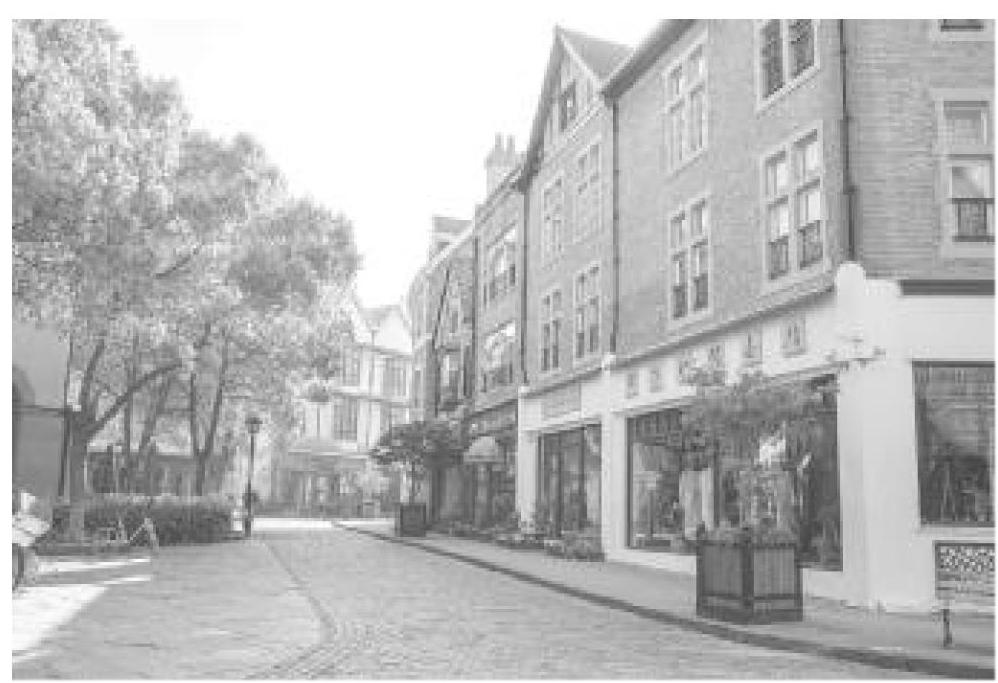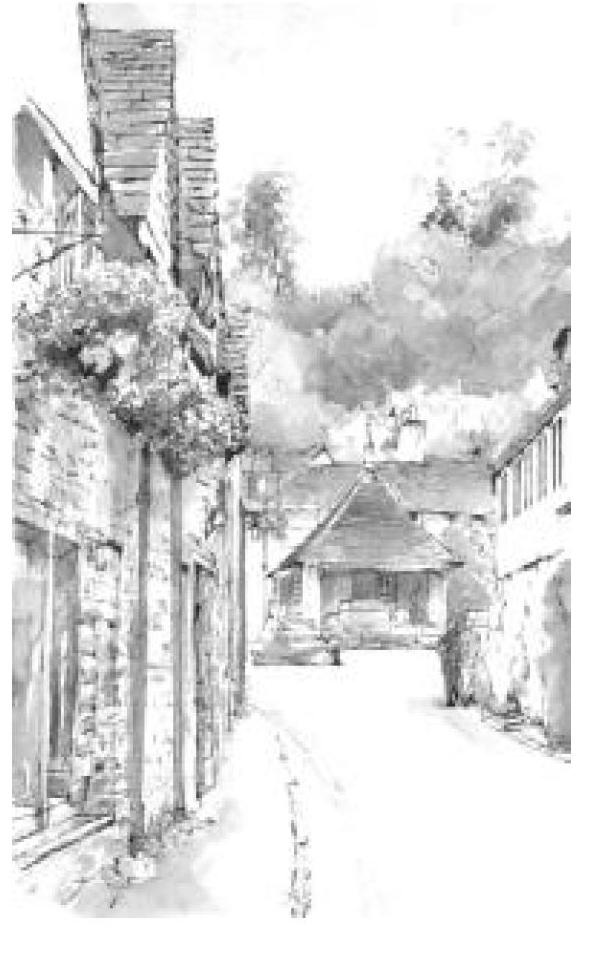小镇阳光随笔
2019-05-24


田園牧歌,简单和乐,这是不少人都向往的生活。本期介绍的《小镇阳光随笔》就刻画了这样一个充满牧歌情调的可爱小镇。
本书的作者斯蒂芬·里柯克(Stephen Leacock,1869—1944)是加拿大著名幽默作家,也是加拿大最享有世界声誉的作家之一。他的作品承继了英国幽默传统而又有其独特的色彩,文笔生动风趣,意义耐人寻味,深得加拿大乃至全世界读者的由衷喜爱。加拿大人常常自豪地说:英国有狄更斯,美国有马克·吐温,我们加拿大有里柯克。
《小镇阳光随笔》是里柯克出版于1912年的一部著名长篇幽默小说,也是他的主要代表作之一。这是里柯克专门为加拿大读者写的一部以加拿大为背景的小说,全书由几个既相对独立又相互关联的短篇故事构成。作者以他生活过的安大略省的奥瑞利亚镇(Orillia,Ontario)为原型,塑造了一个牧歌情调与喜剧色彩交融的典型的加拿大小镇——马里波萨,通过将镇上发生的几件趣事、怪事娓娓道来,生动地描摹了小镇的风俗人情。书中采用漫画式的笔法刻画了一群既可笑又可爱的镇民,在揶揄镇民们可笑的人性弱点的同时始终保持着一份善意和同情,温和的笔触似一抹宽厚悲悯的微笑,在调侃小镇的故人往事中也流露出对故乡的追忆与回想。这本书的出版奠定了里柯克在加拿大文学史以及加拿大人民心中不可动摇的地位。里柯克当年居住过并用作马里波萨镇蓝本的小镇奥瑞利亚,如今已改名为“艳阳镇”。
On the careless eye the scene on the Main Street of a summer afternoon is one of deep and unbroken peace. The empty street sleeps in the sunshine. There is a horse and buggy tied to the hitching post in front of Glovers hardware store. There is, usually and commonly, the burly figure of Mr. Smith, proprietor of Smiths Hotel, standing in his chequered waistcoat on the steps of his hostelry, and perhaps, further up the street, Lawyer Macartney going for his afternoon mail, or the Rev. Mr. Drone, the Rural Dean of the Church of England Church, going home to get his fishing rod after a mothers auxiliary meeting.
But this quiet is mere appearance. In reality, and to those who know it, the place is a perfect hive of activity. Why, at Netleys butcher shop (established in 1882) there are no less than four men working on the sausage machines in the basement; at the Newspacket office there are as many more job-printing; there is a long distance telephone with four distracting girls on high stools wearing steel caps and talking incessantly; in the offices in McCarthys block are dentists and lawyers with their coats off, ready to work at any moment; and from the big planing factory down beside the lake where the railroad siding is, you may hear all through the hours of the summer afternoon the long-drawn music of the running saw.
Busy—well, I should think so! Ask any of its inhabitants if Mariposa isnt a busy, hustling, thriving town. Ask Mullins, the manager of the Exchange Bank, who comes hustling over to his office from the Mariposa House every day at 10:30 and has scarcely time all morning to go out and take a drink with the manager of the Commercial; or ask—well, for the matter of that, ask any of them if they ever knew a more rushing go-ahead town than Mariposa.
Of course if you come to the place fresh from New York, you are deceived. Your standard of vision is all astray. You do think the place is quiet. You do imagine that Mr. Smith is asleep merely because he closes his eyes as he stands. But live in Mariposa for six months or a year and then you will begin to understand it better: the buildings get higher and higher; the Mariposa House grows more and more luxurious; McCarthys block towers to the sky; the buses roar and hum to the station; the trains shriek; the traffic multiplies; the people move faster and faster; a dense crowd swirls to and fro in the post-office and the five and ten cent store—and amusements! Well, now! Lacrosse, baseball, excursions, dances, the Firemans Ball every winter and the Catholic picnic every summer; and music—the town band in the park every Wednesday evening, and the Oddfellows brass band on the street every other Friday; the Mariposa Quartette, the Salvation Army—why, after a few months residence you begin to realize that the place is a mere mad round of gaiety.
Not that the little town is always gay or always bright in the sunshine. There never was such a place for changing its character with the season. Dark enough and dull it seems of a winter night, the wooden sidewalks creaking with the frost, and the lights burning dim behind the shop windows. In olden times the lights were coal oil lamps; now, of course, they are, or are supposed to be, electricity, brought from the power house on the lower Ossawippi nineteen miles away. But, somehow, though it starts off as electricity from the Ossawippi rapids, by the time it gets to Mariposa and filters into the little bulbs behind the frosty windows of the shops, it has turned into coal oil again, as yellow and bleared as ever.
After the winter, the snow melts and the ice goes out of the lake, the sun shines high and the shanty-men come down from the lumber woods and lie round drunk on the sidewalk outside of Smiths Hotel—and thats spring time. Mariposa is then a fierce, dangerous lumber town, calculated to terrorize the soul of a newcomer who does not understand that this also is only an appearance, and that presently the rough-looking shanty-men will change their clothes and turn back again into farmers.
Then the sun shines warmer and the maple trees come out and Lawyer Macartney puts on his tennis trousers, and thats summer time. The little town changes to a sort of summer resort. There are visitors up from the city. Every one of the seven cottages along the lake is full. The Mariposa Belle churns the waters of the Wissanotti into foam as she sails out from the wharf, in a cloud of flags, the band playing and the daughters and sisters of the Knights of Pythias dancing gaily on the deck.
That changes too. The days shorten. The visitors disappear. The goldenrod beside the meadow droops and withers on its stem. The maples blaze in glory and die. The evening closes dark and chill, and in the gloom of the main corner of Mariposa the Salvation Army around a naphtha lamp lift up the confession of their sins—and that is autumn. Thus the year runs its round, moving and changing in Mariposa, much as it does in other places.
不留心細看的话,你会觉得夏日午后的主街沉浸在一片深沉的宁谧之中。空荡荡的街道在阳光下安睡着。一辆轻型马车拴在格罗佛五金店门前的系留柱上。平常这个时候,史密斯旅馆的老板——魁梧壮实的史密斯先生就穿着他那件格子西装背心站在旅馆的台阶上。沿街而上,你也许会看到麦卡特尼律师正走去取下午的邮件,或者看到圣公会教堂的乡村教长德罗恩牧师在主持完母亲辅助会后正回家拿钓鱼竿。
但这种宁静只是表象。事实上,对熟悉这里的人来说,马里波萨实在是个喧杂热闹之地。你瞧,奈特利肉铺(建于1882年)里至少有四个工人在地下室的几台香肠机旁忙活;新闻出版社的办公室里也有好几个人在忙着印刷各种纸品;负责长途电话接线的四位美女头戴钢帽,正坐在高脚凳子上讲个不停;麦卡锡大楼的办公室里,牙医和律师们脱了外套,随时准备开工;湖边的铁路侧线旁有个大型的刨木厂,夏天的一整个下午你都能听到从里面传来吱吱呀呀的锯木声。
